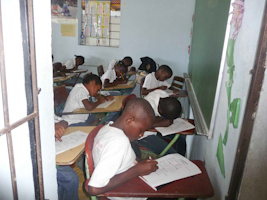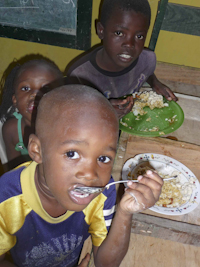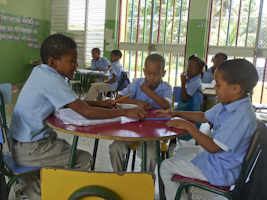I knew that local elections were being held in the Dominican Republic, but apparently the exam period for schools had been shifted from June to May and very few people knew this well in advance. From Thursday to Tuesday, the school buildings were being used for the elections, banks were closed, ATM cash dispensers were empty, shops closed, and an alcohol prohibition applied in cafés  and restaurants.
and restaurants.
However, everything went off quietly and afterwards there were parades of cars honking loudly with lots of music and enthusiastic people waving flags.
The schools could not be visited during the last week because of the exams.
The street scene in Sosúa has changed. At night there are Haitian children sleeping on sidewalks. A saddening sight. Many fled Haiti in the hope of a better life in the Dominican Republic. Unfortunately, two weeks after my return home, I heard that one of the street children, a 12-year-old boy, has murdered another 15-year old.
Thanks to additional donations from our supporters, I could give money to Judith of the Colegio Asher to help with relief for some 20 Haitian refugee children, so they do not have to  roam the streets with all the risks that entails. Judith will buy a number of beds, so that these refugee children no longer have to sleep on the floor in an outbuilding of the school. In addition, some medicines, clothes and school supplies for the coming school year could be bought.
roam the streets with all the risks that entails. Judith will buy a number of beds, so that these refugee children no longer have to sleep on the floor in an outbuilding of the school. In addition, some medicines, clothes and school supplies for the coming school year could be bought.
We received money from the Canning Trust in the UK for the appointment of two teachers at the Colegio for two years, because the school so desperately needs this extra capacity now. There is a lack of space, for which a solution must be found. Meanwhile, there has been an intensive search for possibilities to build another school and home for orphans in the neighbourhood.
The school results of the pupils are happily very good, and those who need extra lessons receive them during the summer holiday. In the absence of additional salary for teachers, Judith herself gives these lessons. The pupils really do not want any holiday at all, but long for the attention and care they receive at school.
While I was staying in Sosua, Karen, president of the Sosua Kids Association in Sosua, went with a group of Canadian doctors to tent camps in Haiti for a few days. I was able to give her a suitcase I had brought from the Netherlands (also thanks to Dave's help!) containing children’s clothes and school supplies, and I was therefore sure that everything would get to the right place. The situation in Haiti is still unchanged and dramatic, she told me after her return.
I attended a meeting of the Sosua Kids Association, which was very useful. Thus I got a clearer picture of the possibilities and difficulties in providing school uniforms and accessories. The board members have various nationalities and this means a variety of ideas and opinions. Together they do a lot of work and also regularly organise local fundraising activities. I once again visited the public school ‘Escuela Gregorio Luperón’, where I was warmly welcomed by Diego, the headmaster, and the deputy head Teresita. I was able to ask many questions about the school, and I had every opportunity to take photos. I am now part of the family there.
I once again visited the public school ‘Escuela Gregorio Luperón’, where I was warmly welcomed by Diego, the headmaster, and the deputy head Teresita. I was able to ask many questions about the school, and I had every opportunity to take photos. I am now part of the family there.
From the hotel Casa Marina Reef, where I once more received all their possible help and cooperation, we took four guests to visit the Colegio Asher. Roberto came and picked us up with the ‘camioneta’ (van). The visitors were clearly impressed by what they saw there. The poor shacks around the school provided a painful contrast to what the tourists usually see in the resorts.  Elke and Ernst, a German married couple who visited the school, offered our foundation assistance, including establishing and maintaining a site in Germany. We gratefully made use of this offer and, since the first half of June, our site has been under construction at: www.sosuakids2school.de on internet!
Elke and Ernst, a German married couple who visited the school, offered our foundation assistance, including establishing and maintaining a site in Germany. We gratefully made use of this offer and, since the first half of June, our site has been under construction at: www.sosuakids2school.de on internet!
Each time, I am very happy to have been in Sosua again. I have seen and learned a lot about the school systems and the backgrounds. We cannot solve the Haitian refugee problem. However, thanks to you we have now given some 300 deprived Dominican and Haitian children a chance of a better life. This is certainly ‘something’, and we want to carry on doing this. ___